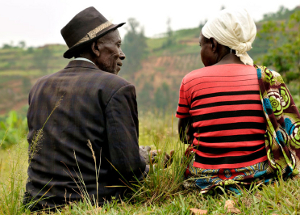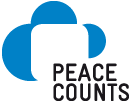Rwanda: Reconciliation

Text based on reportage by Markus Wanzeck
Photos: Eric Vazzoler
Long after the genocide of 1994, Rwanda is still a wounded, divided nation. AMI, a small organization located in the south of the country, is attempting something that might seem unthinkable: to reconcile murderers and the families of people they killed. Through discussion groups and construction projects, the former enemies are cautiously moving closer.
Dieudonné Munyankiko remembers the spring of 1994 all too vividly. In this former school building in Murambi, several kilometers west of the city of Butare, the remains of tens of thousands of Tutsi are on display.
In April of 1994 people sought refuge here while Hutu militias swept through the region exterminating members of the Tutsi minority. Today the place is a memorial to the victims of that massacre. Munyankiko‘s mother’s family was among those killed by Hutu extremists.
When the Tutsi rebel army under the current president Paul Kagama took control of Rwanda in the autumn of 1994, the majority of his father’s relatives fell victim to acts of retaliation.
Dieudonné was seventeen at the time. He and his parents survived in a hiding place on the edges of Butare. “As the son of a Tutsi and a Hutu it is easy for me to speak of reconciliation. But it is also endlessly difficult, because both sides are prejudiced against me.”
Dieudonné founded AMI in February 2000 with eleven additional helpers. The organisation’s name is the French word for “friend.” It had been six years since the massacre, when three short months saw the murders of up to one million Tutsi and moderate Hutus.
Since its founding, the organisation has offered violence prevention courses for policemen, trained volunteers to counsel fellow villagers affected by trauma, and supported school theater groups where Hutu and Tutsi children perform together. And repeatedly, they attempt the impossible: reconciling the perpetrators and their victims.
This unusual discussion group on a hill in the southern Rwandan district of Huye is called “Groupe de rapprochement.” Survivors of the genocide sit opposite people who murdered their relatives. They are here in response to an invitation from the organization AMI.
Before AMI began its work here, Hutu and Tutsi went out of each other’s way. The survivors feel horror and anger at the sight of people who committed acts of violence, people who are gradually reemerging from years spent in prison or exile. They, in turn, fear that the survivors will want revenge.
Dieudonné Munyankiko addresses the audience in the name of the organisation. “We thank you for being here today, and for your courage. We know that many people will look down at you or threaten you. Today the former prisoners and the survivors will stay by themselves. Say honestly what you think. But don’t name names from the other group! Remember that all of us have been wounded. The murderers, too.”
The survivors crouch in a half circle around a woman who sits with her back against an old eucalyptus tree. She notes down the remarks that will later be presented to the other side. She writes: “Outside the discussion group no open conversation possible – fear. Survivors are excluded – loneliness. Perpetrators pay compensation reluctantly or not at all – renewed hatred.”
She looks at the list and says, “If we’re really as honest as they’re asking us to be, it’s not going to help much with reconciliation!”
“At least we’re talking to each other again,” a young man in the back row calls out. “That’s not bad, is it?”
“But what’s supposed to be good about it?” Pauline Mugirasoni asks, standing up. “Many perpetrators speak of being sorry. But their words mean nothing.” The 56-year-old woman does not name names, but everyone in the group knows who she means: François Sezirahiga and Felicité Mushyaka.
The two are members of the ex-convicts group. For Pauline, they are the people behind the violent death of her father-inlaw.
In the ex-prisoners group, a few yards away, Felicité takes the floor. Her husband led the mob that murdered Pauline’s father-in-law in 1994. “I really wish for peace to be possible again. But how?” she asks. Felicité raises her voice and gestures forcefully, waving her arms up and down in the rhythm of her sentences.
“For thirteen years now my husband has been in prison – and for what? I don’t know how I’m supposed to pay the compensation to the victims. And the woman who got my husband thrown into prison won’t even look at me,” she concludes in a shrill voice, looking straight at Pauline.
François sits in front of the woman clothed in black and yellow and stares at the ground. He was there, back then. He was part of the mob, along with Felicité’s husband. He was released after serving eight years.
Pauline from the survivors group had asked the people at AMI to invite him to the discussion group. She was hoping for an apology.
François came. But so far he has not found the right words. “I’m sorry about what happened,” he admits. “I’d like to say that to Pauline. But I can’t do it.” “Someday I’ll ask Pauline’s forgiveness.”
For what? “I killed her father-in-law.”
Did you know him? “Yes. I worked for him. We were even friends.”
Then why did you kill him? “The government said we should kill the Tutsi.”
And you obeyed? “The mayor sent us out, a whole group.”
Did Pauline’s father-in-law recognize you? “He saw me. He asked me, ‘You, too, my friend? You are coming here to kill me?’”
What did you answer? “Yes.”
A pause.
“Actually I didn’t really kill Pauline’s father-in-law. I just stood by and watched. Beyond that I just attended to the pit latrine where the corpse was supposed to disappear. Others carry much greater guilt than I.”
After another pause he says, “Yes, I killed the old man. I have nightmares. I have no peace of mind.”
Is it fair to expect anyone to reach out to the person who killed his or her wife or husband, parents, or children? “It is almost inhumanly impossible,” Dieudonné says. “But what’s the alternative?”
Rwanda has eleven million inhabitants. AMI has a staff of twelve. “It will only happen in many small steps,” Dieudonné says. “But one can take them.”
The group’s attempt at rapprochement takes place in three stages. First the participants speak within their own group about their experiences and feelings.
The next step is for the two groups to exchange the written record of their meetings. It is hoped that the distance created by words on a page will give each side time to understand the other’s viewpoint.
Direct communication is the third step. At the end, if all goes well, comes the written agreement. Perpetrators and victims sit down to draft it together.
Shared reconstruction projects are meant to help bridge the deep divides between the groups. At AMI, victims and perpetrators work together building housing for genocide survivors.
It is important to reach out to perpetrators, Dieudonné says, giving them a role and a future. “Us here and you over there – that kind of exclusion should never again be allowed to come to power.”
AMI’s motto is “Ubuntu. The word means “Humanity” in Rwanda’s official language Kinyarwanda.
Humanity: That’s what it’s about. To find common ground instead of the divisive categories Hutu and Tutsi and the distinction between perpetrators and victims.
Otherwise, how can people in Rwanda live in integrated communities, with all the unaddressed issues remaining between them?
AMI has the official status of an NGO under the Rwandan government. It is even allowed to use the Huye district’s local government administrative offices for its meetings and discussions.
That was not always the case. The authoritarian government of Rwanda was initially suspicious of the group’s political tendencies. In early 2002, three AMI employees were locked up for “endangering national security.” They were only released after Amnesty International got involved.
Today local authorities support AMI. Ideally, that means their work should no longer be so difficult.
Butare, a city of a hundred thousand, still has eight thousand people in prison. At one time there were more than twelve thousand. Many were held for years without being charged.
One man in the ex-convicts’ group describes how he spent twelve years in prison in Butare, innocent. Now his wife is gone. Others tell of exaggerated compensation demands and of a corrupt judicial system.
AMI has established a discussion group for former lay judges. They were appointed throughout Rwanda to prosecute cases connected to the genocide. An idea that was destined to fail, with so many million murders, so many rapes and mutilations, so many destroyed homes.
In most cases the volunteer judges had no choice but simply to believe one side or the other. In the discussion group, they speak openly of their insecurities and doubts. Did they condemn innocent people to prison terms? Did murderers walk off unpunished?
Everyone has heard the slogan “No justice, no peace.” But is it true? What happens when real justice is unattainable?
Dieudonné Munyanyiko says his belief is as follows: “Here in Rwanda, we can either try to pursue justice and punish every wrong that was committed. Or we can accept the injustice and work toward a shared future for everyone.”


